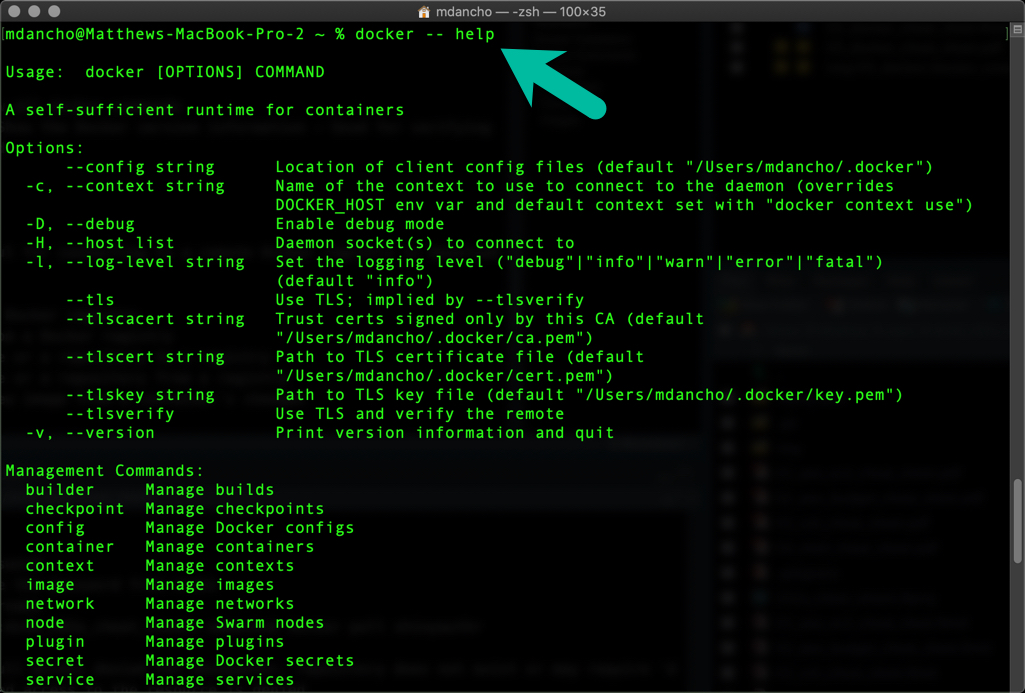With version 0.9.0 and later, the Docker extension provides more support for debugging applications within Docker containers, such as scaffolding launch.json configurations for attaching a debugger to applications running within a container.
We would like to show you a description here but the site won’t allow us. Docker pull mysql docker create -volumes-from mymysqlcontainer.name mymysqlcontainertmp mysql By not immediately removing the original mymysqlcontainer yet, you have the ability to revert back to the known working container if the upgraded container doesn't have the right data, or fails a sanity test.
The Docker extension provides a docker debug configuration provider that manages how VS Code will launch an application and/or attach a debugger to the application in a running Docker container. This provider is configured via entries within launch.json, with configuration being specific to each application platform supported by the provider.

Download Docker Container Manually Free
The Docker extension currently supports debugging Node.js, Python, and .NET Core applications within Docker containers.
Requirements
Scaffolding or pasting a launch configuration into launch.json is not sufficient to build and debug a Docker container. To successfully run a Docker launch configuration, you must have:
- A Dockerfile.
docker-buildanddocker-runtasks intasks.json.- A launch configuration that invokes these tasks.
We recommend using the Docker: Add Docker Files to Workspace... command to create these items, if none of these assets already exist. If you already have a functional Dockerfile, we recommend using the Docker: Initialize for Docker debugging command to scaffold a launch configuration and Docker-related tasks.
Node.js
More information about debugging Node.js applications within Docker containers can be found at Debug Node.js within a container.

Example launch.json configuration for debugging a Node.js application:
Python
More information about debugging Python applications within Docker containers can be found at Debug Python within a container.
Example launch.json configuration for debugging a Python application:
.NET Core
More information about debugging .NET Core applications within Docker containers can be found in Debug .NET Core within Docker containers.
The previous (Preview) .NET Core Docker debugging support (utilizing 'type': 'docker-coreclr' instead of the current preview's 'type': 'docker') is being deprecated. You can still find documentation on that support at Debug .NET Core - Deprecated.

Download Docker Container Manually Windows 10
Example launch.json configuration for debugging a .NET Core application:
Configuration reference

| Property | Description |
|---|---|
containerName | Name of the container used for debugging. |
dockerServerReadyAction | Options for launching a browser to the Docker container. Similar to serverReadyAction, but replaces container ports with host ports. |
removeContainerAfterDebug | Whether to remove the debug container after debugging. |
platform | The target platform for the application. Can be netCore or node. |
netCore | Options for debugging .NET Core projects in Docker. |
node | Options for debugging Node.js projects in Docker. |
python | Options for debugging Python projects in Docker. |
dockerServerReadyAction object properties
| Property | Description |
|---|---|
action | The action to take when the pattern is found. Can be debugWithChrome or openExternally. |
containerName | The container name to match the host port. |
pattern | The regex pattern to look for in Debug console output. |
uriFormat | The URI format to launch. |
webRoot | The root folder from which web pages are served. Used only when action is set to debugWithChrome. |

node object properties
These properties are the same as those described in the VS Code documentation for attaching a debugger to Node.js applications. All properties passed in the node object will be passed on to the Node.js debug adaptor, even if not specifically listed below.
Download Docker Container Manually Download
| Property | Description | Default |
|---|---|---|
port | Optional. The debug port to use. | 9229 |
address | Optional. TCP/IP address of the debug port. | |
sourceMaps | Optional. Enable source maps by setting this to true. | |
outFiles | Optional. Array of glob patterns for locating generated JavaScript files. | |
autoAttachChildProcesses | Optional. Track all subprocesses of debuggee and automatically attach to those that are launched in debug mode. | |
timeout | Optional. When restarting a session, give up after this number of milliseconds. | |
stopOnEntry | Optional. Break immediately when the program launches. | |
localRoot | Optional. VS Code's root directory. | The root workspace folder. |
remoteRoot | Optional. Node's root directory within the Docker container. | /usr/src/app |
smartStep | Optional. Try to automatically step over code that doesn't map to source files. | |
skipFiles | Optional. Automatically skip files covered by these glob patterns. | |
trace | Optional. Enable diagnostic output. |
python object properties
| Property | Description | Default |
|---|---|---|
host | The host for remote debugging. | |
port | The port for remote debugging. | 5678 |
pathMappings | Maps the project path between local machine and remote host. | |
projectType | Type of Python app. | |
justMyCode | Debug only user-written code. | |
django | Django debugging. | false |
jinja | Jinja template debugging (such as Flask). | false |
Download Docker Container Manually Using
netCore object properties
Properties passed in the netCore object are generally passed on to the .NET Core debug adaptor, even if not specifically listed below. The complete list of debugger properties is in the OmniSharp VS Code extension documentation.
| Property | Description |
|---|---|
appProject | The .NET Core project (.csproj, .fsproj, etc.) to debug. |
Next steps
Read on to learn more about:
